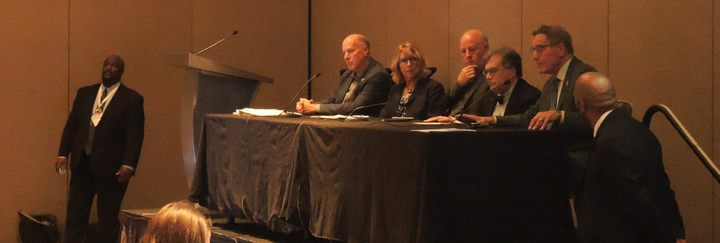ASTMH Annual Meeting 2025
blogEmerging from the Pandemic to Find Science Under Assault
By: Matthew Davis, Burness

“We are in very dark times.”
That was a somber message from Peter J. Hotez, PhD, Dean of the National School of Tropical Medicine at Baylor College of Medicine, speaking at the #TropMed23 “Science Under Assault” symposium that was exploring the pandemic-fueled political polarization of science that is drawing comparisons to the McCarthy era.
Hotez himself has been the target of death threats due to his high-profile role on social media and cable news shows defending vaccines in particular and science in general. In fact, his presence at the Annual Meeting required extra security precautions around the hotel hosting the conference – and inside and outside the room where he was speaking.
ASTMH President Dan Bausch, MD, MPH&TM, FASTMH, said it was the first time in his 10 years of working in various leadership roles with ASTMH “where we had to specifically address security issues for a session” at an annual meeting.
Hotez challenged the idea the central problem he and other scientists are facing his “misinformation.” Rather, he said efforts to demonize people like himself and Dr. Anthony Fauci – and harass researchers who have worked in virology with subpoenas from congressional committees – is “deliberate and politically motivated.”
“The goal of what they are trying to do to is to shut us down and silence us,” he said.
Meanwhile, Bausch shared a letter from a person he did not name who had been coming to the Annual Meeting for 25 years – but was unable to this year due to unsubstantiated charges from partisan members of Congress that his work was connected to an alleged “lab leak” of the COVID-19 virus. The scientist told Bausch that he was now on “administrative leave,” from his institution and “forbidden to come to work … or even travel to the ASTMH meeting.”
Peter Daszak, PhD, President of EcoHealth Alliance, recounted the searing experience of how his long-term collaboration with the Wuhan Institute of Virology studying coronaviruses in bats made him the focal point of the lab leak conspiracy theory. He said it was like living the boiled frog analogy. He said the attacks slowly escalated to the point that his office and house were broken into, he had to institute security measures for his staff, and now he is facing multiple lawsuits and congressional investigations.
“We all need to get educated, because once they finish with me, they are coming for you,” he said. “So wise up and toughen up.”
Carol Schadelbauer with Burness, a communications firm that works extensively with scientists, said this was the most difficult time she has seen in her 35-year career in science communications. But she was optimistic that, while there are no immediate solutions to the current dilemma, there are ways for scientists to begin the slow, hard work of regaining the high ground. Among her suggestions:
- “Get educated,” she said. Schadelbauer said it was especially important for anyone pursuing a career in science to take a course in communications — and that universities should require it.
- She recommended seeking out “unconventional messengers,” such as people in trusted professions or with high profiles in the world of sports or entertainment to speak out in support of medical research. She pointed to recent success in providing a counterpoint to climate deniers by using weather forecasters and physicians as spokespeople.
- Schadelbauer also said that there is a need for research to identify the narratives that people are following about certain topics — to “understand what is going on in their heads” — and use these insights to develop messages that will resonate with them.
She said the goal is not to try to persuade those at the extremes. Rather, it’s to connect with people who may be skeptical but are receptive to a dialogue.
Richard Baron, MD, President and CEO of the American Board of Internal Medicine Foundation, encouraged medical researchers to embrace humility and acknowledge that “so much of what we do” is because the public provides funding to support medical research. But he lamented how the scientists now being harassed are finding the institutions where they work often are not providing support.
Daszak agreed. He said he found it “incredible” how many institutions and organizations that should defend scientists now under assault are in the current climate “carefully turning away.” Hotez said with the exception of ASTMH, scientific societies have been largely silent. He also called out the Biden administration and specifically the White House Office of Science and Technology Policy (OSTP) for failing to defend scientists now being harassed by investigative committees on Capitol Hill.
Related Posts
By: Matthew Davis, Burness